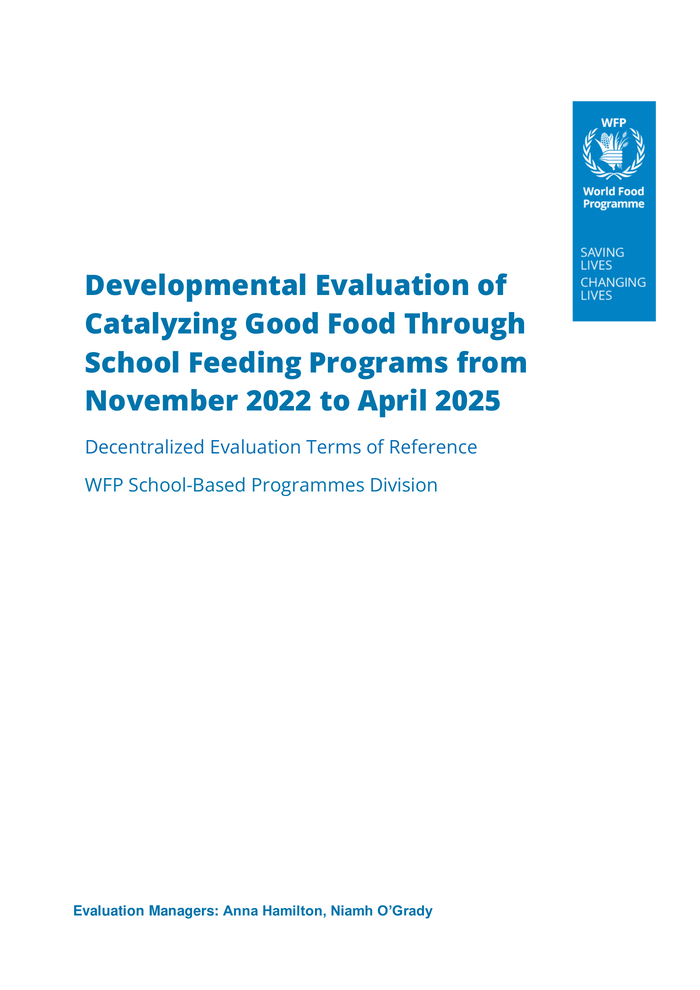Developmental Evaluation of Catalyzing Good Food Through School Feeding Programs from November 2022 to April 2025 – World | ReliefWeb
Skip to main content
World
+ 5 more
Format
Evaluation and Lessons Learned
Source
Posted
6 Aug 2025
Originally published
6 Aug 2025
Origin
View original
Attachments
Background
This document was co-developed by the Monitoring, Evaluation, Research and Learning team of the WFP School Feeding Programmes Division and the Evaluation Team based on an initial document review and extensive stakeholder consultation. The purpose of this ToR is to provide stakeholders with key information about the evaluation design and methodology, provide guidance to stakeholders, and clarify expectations during the various phases of the evaluation.
These terms of reference present a first outline of the methodology. The full methodology will be reflected in the scoping document that will be produced after the first strategic learning workshop held in Nairobi, September 19-21, 2023.
INTRODUCTION
These Terms of Reference describe the proposed evaluation design and methodology for the Developmental Evaluation of the Rockefeller funded program entitled “Catalyzing good food through school feeding and food programmes”, to be conducted from September 2023 to April 2025, and commissioned by WFP’s School Feeding Programmes division.
WFP is partnering with the Rockefeller Foundation (RF) (from November 2021 to April 2025) on a portfolio which comprises a global project, titled ‘Catalyzing good food through school feeding and food-based programs’ and a regional project titled “Scaling up fortified whole meal in school feeding programs in Rwanda and Burundi and supporting an innovation hub in Kenya”.
The overarching goal of this partnership is to improve the nutritional quality of diets, food-based safety net sustainability, equity of national food systems, and positive economic impact for local communities in Rwanda, Burundi, Benin, Ghana, Honduras, and India. This will be achieved by leveraging institutional food procurement mechanisms, strengthening supply chains, and influencing healthy eating behavior through food-based programmes, primarily school meals programmes.
The projects will develop and test approaches to shift towards more nutritious options for school meals which boost local economic opportunity and increase environmental sustainability. Activities will address micronutrient deficiencies, improve schooling effectiveness, and improve intergenerational opportunity for vulnerable populations, particularly young girls. This will in turn have a ripple effect in the overall food system, as the demand for nutritious foods signals for supply chains to shift to be responsive. Through this influence, WFP will also support local value chain actors including smallholder farmers and caterers, the vast majority of whom are women, and have a significant impact on their inclusion in markets, economic empowerment, and livelihoods.
Both the global and regional projects involve a combination of direct implementation to scale action and parallel work to build knowledge and evidence, test metrics, and advocate for change in healthier diets. For example, the project is be implemented through four components: Optimization of school menus and strengthening demand and supply chains (Component 1); Assessment, metrics, and indicator development (Component 2); Advocacy and support for policy adoption and change (Component 3); and Development of the Good Food Scoring Framework (Component 4).
Given the innovative nature of this pilot project, which aims to develop new and innovative approaches to catalyse food systems transformation through endogenous socioeconomic, health, educational, and environmental sustainability, the evaluation will take a developmental approach. Developmental evaluations are appropriate for evaluating the nascent and adaptive development of new initiatives in complex settings, which is the case with this pilot project.
The developmental evaluation will help country offices in particular to test assumptions and adapt project strategies to this dynamic environment. Because the changes envisioned in the overarching Theory of Change are not linear, learning and subsequent management of this knowledge are crucial to this project. Learning will include specific strategic learning questions that will fill
Report details
Primary country
Other countries
Source
Format
Language
Share report link
Related Content


Dining and Cooking